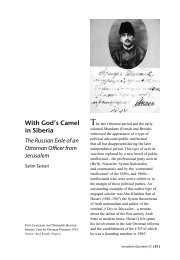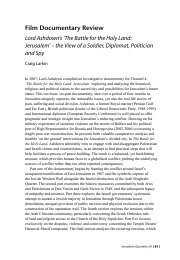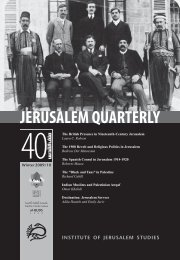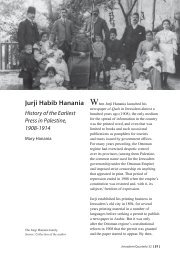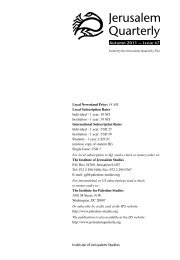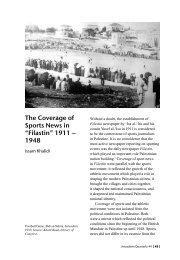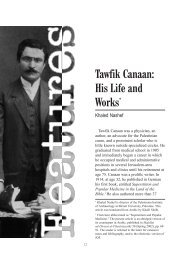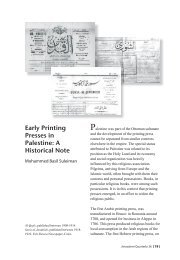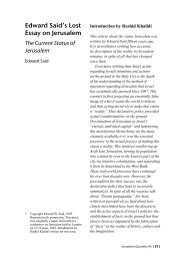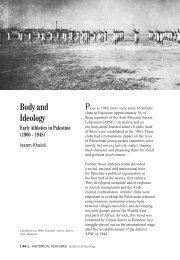PLUNDERING PALESTINE - Jerusalem Quarterly
PLUNDERING PALESTINE - Jerusalem Quarterly
PLUNDERING PALESTINE - Jerusalem Quarterly
You also want an ePaper? Increase the reach of your titles
YUMPU automatically turns print PDFs into web optimized ePapers that Google loves.
The IAA has a small anti-theft unit that monitors the work of registered antiquity<br />
dealers and the gangs of looters, and the Palestinian Ministry of Tourism has a<br />
special tourist unit. Both departments are understaffed and poorly equipped to carry<br />
out the tedious job of protecting antiquities in the country, however. The staff of the<br />
specialized Israeli unit numbers less than a dozen full-time workers. The Tourist<br />
Police unit of the Palestinian Authority is also small, and functional in only the major<br />
cities of Bethlehem, Jericho and Nablus. Neither unit operates a network of informers<br />
through which they could learn about major purchases, and only occasionally arrests<br />
people trying to dig illegally or sell archaeological finds without a permit.<br />
By and large, criminal penalties in the Palestinian areas and in Israel are not deterrents<br />
to pillage. If convicted, illegal diggers receive short or even suspended sentences,<br />
usually a small fine, although the law’s maximum penalty is up to three years in<br />
prison. Courts in both countries are usually lenient on offenders of this kind. 15 There<br />
is no limit to the number of archaeological items one can take out of the country,<br />
and permits are issued free of charge if items are taken to the Antiquity Authority’s<br />
headquarters at the Rockefeller Museum in East <strong>Jerusalem</strong> where they can be<br />
authenticated and registered. The Authority has even opened an office at the Tel<br />
Aviv airport to register artefacts taken away by tourists and collectors. The IAA has<br />
the right to confiscate items barred from export, even if an object is not technically<br />
an antiquity as defined by law (anything older than 200 years), but in practice, the<br />
authority does not enforce its permit policy for individual artefacts and turns a blind<br />
eye to tourists taking small numbers of antiquities.<br />
Outlawing the Trade in Antiquities: The Power of the Lobby<br />
In a 1989 article on looting in Israel, archaeologists David Ilan, Uzi Dahari and<br />
Gideon Avni declared that current antiquities laws in Israel are not helping to protect<br />
antiquities in Israel, let alone in the Palestinian areas. The authors suggested outlawing<br />
the trade in antiquities to remove the main incentive for plundering antiquities. 16<br />
Like most Palestinian and Israeli archaeologists, they argued that if antiquities trade<br />
is outlawed, dealers will no longer be able to operate, and theft from archaeological<br />
sites will stop because looters will lose the incentive to dig. The Israeli dealers’ lobby,<br />
which has included very influential public figures such as Teddy Kollek, ex-mayor<br />
of <strong>Jerusalem</strong> and former defence minister, the late Moshe Dayan (who accumulated<br />
an extensive private collection through unauthorized and unscientific digs using the<br />
Israeli army), as well as curators at the Israel Museum in <strong>Jerusalem</strong> and the Eretz<br />
Museum in Tel Aviv, maintains that if such law is passed, the antiquities trade will<br />
simply continue underground, as in other countries where it is outlawed such as Egypt,<br />
Turkey, Greece, Italy, Cyprus and Jordan.<br />
<strong>Jerusalem</strong> <strong>Quarterly</strong> 33 [ 51 ]



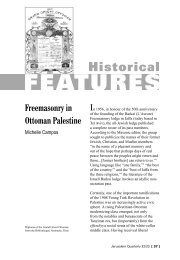
![In Search of Jerusalem Airport [pdf] - Jerusalem Quarterly](https://img.yumpu.com/49007736/1/180x260/in-search-of-jerusalem-airport-pdf-jerusalem-quarterly.jpg?quality=85)

